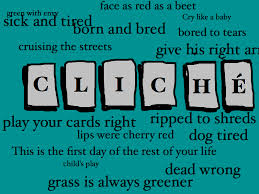cliche
['kli:ʃei]
- n. 陈词滥调;[印刷] 铅版;陈腐思想
- adj. 陈腐的
GRE
cliche 陈词滥调来自click,点击声。来自打印术语,比喻千篇一律,陈词滥调。
- cliché
- cliché: [19] Originally, French clicher meant literally ‘stereotype’ – that is, ‘print from a plate made by making a type-metal cast from a mould of a printing surface’. The word was supposedly imitative of the sound made when the mould was dropped into the molten type metal. Hence a word or phrase that was cliché – had literally been repeated time and time again in identical form from a single printing plate – had become hackneyed.
- cliche (n.)
- 1825, "electrotype, stereotype," from French cliché, a technical word in printer's jargon for "stereotype block," noun use of past participle of clicher "to click" (18c.), supposedly echoic of the sound of a mold striking molten metal. Figurative extension to "trite phrase, worn-out expression" is first attested 1888, following the course of stereotype. Related: Cliched (1928).
- 1. To use a well-worn cliche, it is packed with information.
- 说得老套一点,其内容翔实。
来自柯林斯例句
- 2. I've learned that the cliche about life not being fair is true.
- 我发现“人生是不公平的”这句老话没有错。
来自柯林斯例句
- 3. You should always try to avoid the use of cliche.
- 你应该尽量避免使用陈词滥调.
来自《简明英汉词典》
- 4. He talks uninterestingly in boring cliche & 1 & s.
- 他谈的话没有意味,都是令人生厌的 陈词滥调.
来自《简明英汉词典》
- 5. His article is stuffed with cliche & 1 & .
- 他的文章中满是一些 陈词滥调.
来自《简明英汉词典》
[ cliche 造句 ]
